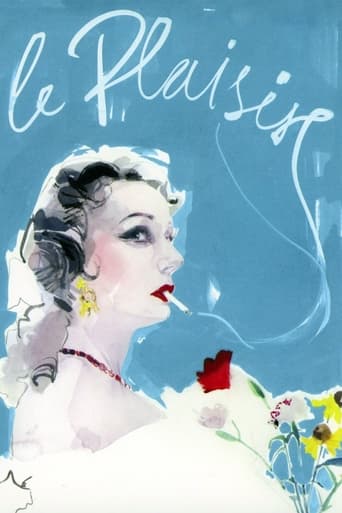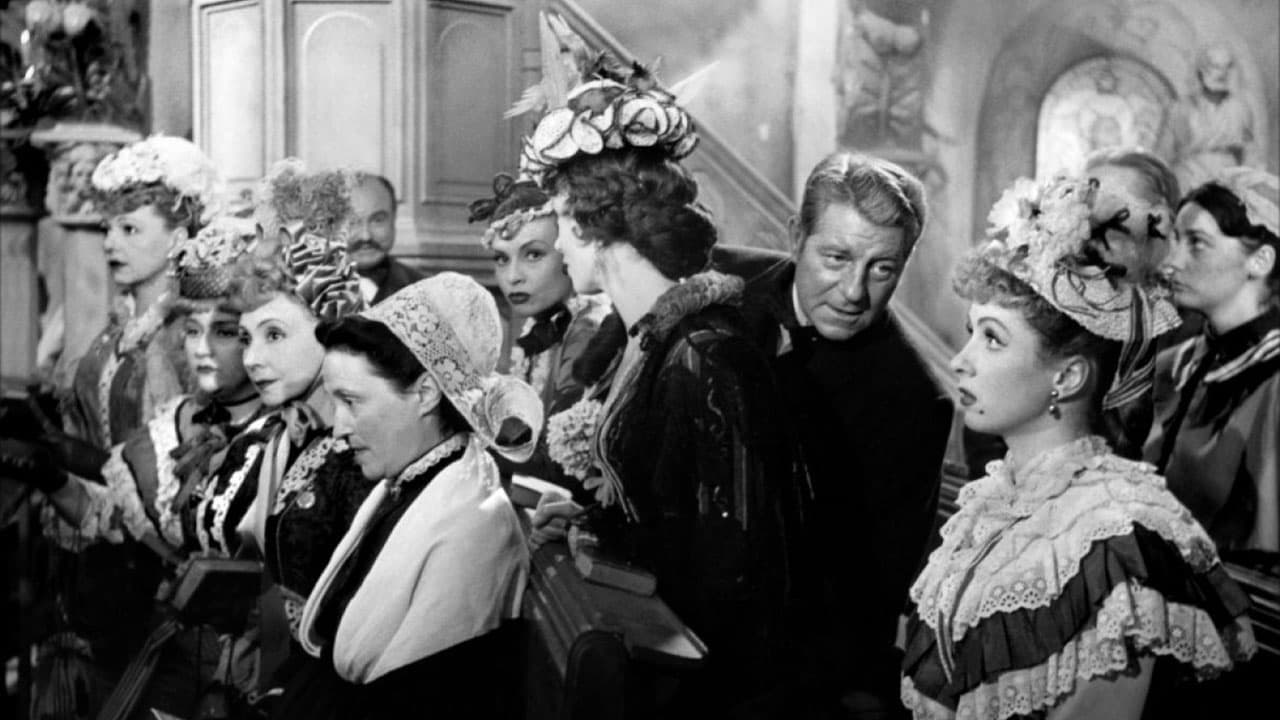Uriah Piddle
There is a certain mood that I am subject to which can be satisfied only by a sunny, quiet, late Sunday afternoon on the couch with Maupassant. (I suspect that Proust would do even better but I lack the stamina.) My wife and I discovered Ophuls by watching The Earings of Madame de... on instant Netflix. When I saw that Le plaisir was Maupassant my heart leaped and, after viewing it, I can now report that the film is as exquisite as the stories themselves (minus the soft Sunday afternoons, of course).The film contains three stories each of which depict an aspect of pleasure: the pleasure of youth, the pleasure of innocence and the pleasure of fate.The second tale, La maison Tellier ('Madame Tellier's Establishment' in my translated collection of Maupassant stories) is the centerpiece of the film. It describes a trip to a small country village by a madame and her platoon of lovable ladies in order to attend the first communion of her nephew where pleasure meets innocence. The scene in the church where Rosa, overcome with memories of her lost innocence, starts to weep and then everyone in the church is soon weeping, is one of the most poignant I have ever seen on film. It is a depiction not only of the seriousness of lost innocence but it's universality as well and serves to show Rosa's sins, on display for all to see, joined in one spontaneous flood of remorse and gratitude by the hidden sins of all the respectable village folk. See if you don't fall into tears as well.If you have not read Maupassant, doing so before viewing the film will heighten your enjoyment. For those who have decided to view the four major Ophuls films, I offer the opinion that this is the best of them and would be a good place to start.Social Commentary: Never having visited France, I cannot say whether the charming French idea of innocent naughtiness has given that country a better life. But if the concept of 'a little sin is the spice of life' adds something to the life of the well off (and I doubt it), it certainly does not work for the poor. Drive through any blighted urban neighborhood for the proof. So-called rigid bourgeois values may not make for good stories or movies but they are essential for those who have it in mind that their children do well in school and go on to live decent lives. Enjoy these stories and, yes, acknowledge the hypocrisy of middle class morality, but do not transplant la belle vie into your own family or you will live to regret it.
jzappa
Max Ophuls' indulgence in mobile camera work is given its utmost fulfillment and flourish in his adaptation of three stories by popular 19th-century French writer Guy de Maupassant, considered one of the fathers of the modern short story. There is largely a rationalization for what may seem like intemperance: Ultimately, life is motion, so this continual progression is the intonation of a notion that doesn't exist in physical form. An enthusiast for immutable motion, Ophuls knew that, due to its pure texture, existence can never be entirely fulfilling, finished, or conclusively satisfied. His world is full of inextricable oppositions, a feature most overtly drawn out in the middle segment of this hilarious, melancholy amalgam. That is why, whether or not one interprets the end as a happy note, it commemorates life.One can trace, throughout the three tales, a clear-cut evolution in the women's statuses. The wife in the first story, embittered, deserted at home every night while her aging husband frolics in the nearby palais de danse in his escapist mask of youth, is completely involved in his compulsion, even content with him in her serfdom. The women of the middle episode are prostitutes in the town brothel, shown as a crucial community establishment, exercising a kind of control over men and, in the instance of Madame Rosa, beginning to spy promise free of the brothel. In the third story, the woman, acting out against the painter and lover who has retained her like a vendible, defies in the sole manner available to her.Admirable in their cleverness, rigor and craftsmanship as the surrounding segments are, it is the middle episode whose pleasure, assured by the movie's title, is most affectingly troubled by inferences, by a feeling of defeat surrounded by merriment, by underflows of dissolution. What is introductory is decidedly presented as a usual night. What follows is decidedly unusual: a night when the lights are out, the den is forsaken, and society falls apart. Within minutes, the businessmen, the town hotshots, their evening's escapade turned down, are fighting, fussing, nearly waging war. When eventually they dissolve, one straggler finds the solution, on a paper that has dropped from the door. The whole bunch has gone on a daylong trip to the country, to be at the first Communion of one of the madames' young niece. The central tale reverberates, in model, the triangular form of the film.A single transient twinkle of shared bedroom eyes is at the crux of Ophuls' arrangement of Maupassant's narrative trifecta. One might say that this lavish tragifarce is structured around it: The sole benign love match in the entire film, and indeed hopeless to attain, the categorical Ophuls love story, nipped in the bud by both an elderly wife and business priorities. Going outward from this axial bond, Ophuls gives us the two train journeys, to and from the country. Being is moving.
Terrell-4
The screen is pitch black and we hear a voice..."I'm so happy to be talking in the dark as if I were beside you, and maybe I am." The speaker is Guy de Maupassant (voiced by Jean Marais), and Le Plaisir is three of his stories filmed by the great director Max Ophuls. The connecting thread? That pleasure, or even love, lies in how people intermingle their lives, with a shrug, assumptions, an apology, a thank you. Le Plaisir is not so much a sophisticated film of attraction and hope as it is a film of rueful wisdom. It's best to keep in mind while watching this movie that while life can be enjoyed, there are times when hope can disappear. The three stories consist of, first, La Masque. We are in 19th Century Paris at the Palais de la Dance, where great, swirling balls are held. This is a place where young women hope to find pleasure and rich men; where old women chase memories and young suitors; where prostitutes and their pimps gather, where the men are young bucks and old goats, where "rough cotton to the finest cambric" can combine. One slender man in full dinner dress rushes into the palace and begins to dance with a beautiful young woman. He prances and kicks, yet his face is like a frozen mask of youth. He collapses on the dance floor and a doctor is called. When the doctor loosens the man's clothes, he finds...well, let's say that when the man is delivered home to his wife by the doctor, she tells him a story of the battle between pleasure and love. In La Maison Tellier, we learn all about a cozy, friendly and long established brothel in a small town on the Channel coast. The bourgeois men of the town are as well-known there as they are to their wives. Then Madame decides to close her establishment for a night so that she and her girls can travel into the countryside to attend her niece's first communion. They have one or two adventures on the train. In the small village they spend the night with Madame's brother and meet the young girl. They attend the communion in the village church. They collect flowers on the way back, and are met with genuine affection and with great gaiety when Madame reopens her place of business the following night. We witness a touching story, as de Maupassant tells us, when pleasure and purity come together. Le Modele gives us a story where pleasure struggles with moral decay, where "happiness is not a joyful thing." We witness a painter and his model meet, rapturously embrace lust and, as lust tires, recrimination grows. The love which endures as the story plays out may not be most people's idea of happiness. This is a marvelously told series of stories. La Masque and Le Modele are relatively short bookends to the major tale of La Maison Tellier. With this one, it would be difficult not to become delighted and engaged with Madame and her girls and her brother. Even the puffed up townsmen are not without a sympathetic side; which man among us wouldn't mind being flattered, even for a price, by Madame's girls?
Spondonman
This is about something most illusory - pleasure, and various definitions of it. One man's pleasure is another's poison - personally the world depicted in such a wistful and playful way by Max Ophuls holds no attraction for me. Sex and dancing aren't everything except if you think so. But as a film this is supreme stuff, Art of a kind never witnessed outside of Ophuls and with a cinematic regard and feeling for 19th century France and the French that remains unsurpassed.Three of Maupassant's short stories are presented - he was sitting by me at the time - for me the most poignant being the first, Le Masque. The opening sequence is an incredible whirling bustling tour de force of camera, set and actor trickery, moving them all about with an astounding ease for 1952. Not once in the packed studio did something crunch into a balustrade or one of the dancers take someone's eye out - choreography so perfect as to make you gasp. We as the modern audience are constantly peeping through lattices, curtains, windows, holes etc at the action within from 1880, occasionally permitted to become part of it with the characters. The loving attention to period detail is constant and total. With so much being studio-bound, I've always wondered why the over-riding image I carry in my head of Le Plaisir is from the 2nd story, La Maison Tellier. With the jolly yokel Jean Gabin at the reins of the cartload of gaudy jolly whores including Danielle Darrieux dashing through the sunny French countryside full of life and happy at the prospect of a night off and more perfect choreography it's a joy to behold.The 3rd piece Le Modele has Simone Simon and Daniel Gelin reviewing their previous performances in La Ronde but with the ending somewhat different! Overall, a totally inconsequential ravishingly beautiful film to cherish, an ideal bookend for La Ronde - pleasure is hardly the word!


 AD
AD




